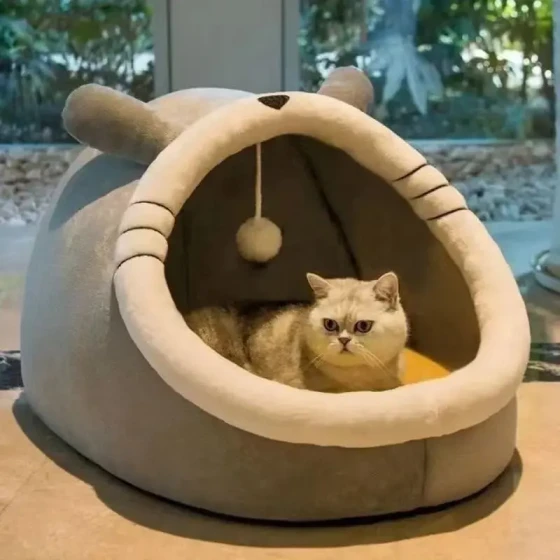What to do if the cat keeps meowing at night (What to do if the newly arrived cat keeps meowing at night)
What to do if the newly arrived cat keeps meowing at night
If a new cat invades its territory and takes away its owner's affection, the old cat will be angry and will constantly bully the new cat that just arrived home. Therefore, to prevent the old cat from bullying the new one, pay attention to a few points when bringing a new cat home:
1. Set up a living area for the new cat at home. Simply put, prepare a barrier for the new and old cats. Keep the new and old cats separated for a period of time.
2. After isolating the new cat at home, the owner should also keep a fair and impartial attitude towards both the new and old cats. When familiarizing the new cat with the new environment, treat both cats fairly and justly.
3. During the isolation period, observe the attitudes and changes of both cats. When the cats’ moods are stable and they are in a good mood, you can try cohabitation. Of course, let the two cats get familiar with each other gradually. You can start by making the partition transparent so the cats can see and interact with each other, then slowly transition to cohabitation. PS: If the old cat bullies the new cat, be sure to stop it immediately and send both cats back to their respective isolation areas. Note that making the old and new cats coexist harmoniously takes time and effort. Once the cats are familiar and accepting of each other, they can live together and the old cat will stop bullying the new cat at will.

What to do if the cat keeps meowing at night after just arriving home
When a dog arrives in a new environment, it may not be able to adapt to the unfamiliar place and smell yet. If possible, place the dog bed at the bedroom door. When you turn off the lights and sleep at night, keep the bedroom door open so the dog can feel your presence when scared. This helps it gradually realize that this is the place it will always stay, no one will hurt it, and the owner will accompany it. After a period of adaptation, it should improve. Spend more time playing with it when you have time, buy some toys to help it adjust to new home life. Reward and pet it on the head or scratch it when it behaves well. Encourage it appropriately to establish trust. I believe before long, you will get along happily. My dog is a Labrador. When it just came home, it was shy and often hid in its bed. I also gradually explored and got along with it. Now, as long as you put your heart into it, it will slowly become bolder, sometimes making your head hurt but also bringing joy 😊.
Solutions for a kitten meowing all night after just arriving home
For a newly arrived kitten, it has not adapted to the new environment and owner yet, and its immunity is very low. At this time, bathing and blow-drying cause severe stress, which can lead to loss of appetite, diarrhea, weakness, and even life-threatening situations. Reputable pet hospitals or stores will not bathe kittens that have not completed their vaccinations or just arrived home, as this is a human-made “death mark.” Owners should not try this at home either. Similarly, even adult cats with full vaccinations need time to adapt to the new environment and owner before bathing after fully establishing trust.
Why does a cat meow all night after arriving home?
I think many cats have some anxiety when first arriving at an unfamiliar environment. In professional terms, this is called a “stress response.” Cats may stop eating or drinking, hide in corners, or keep meowing. If the cat is very shy, this can last one to two days. If the cat is outgoing and not shy, it usually lasts just a few hours.
When a cat keeps meowing, it might feel insecure because of the unfamiliar environment or lost its original companions, so it keeps vocalizing to call for company and get a response. Cats emit sounds when scared or seeking help to make people hear their calls.
Secondly, cats may meow because they are hungry or thirsty. Especially when they are in an unfamiliar environment without knowledge of where the food is, if very hungry, they will continually meow hoping the owner will notice their need.
Additionally, if a cat keeps meowing until its throat is hoarse and still does not stop, owners really need to check if the cat has physical discomfort that it cannot resolve on its own.
What to do if a newly arrived cat keeps meowing at night
Familiarize the kitten with the new environment, soothe it, feed it on time, and buy some cat toys.
1. Take the kitten to explore the environment and show it where the food and water are. Kittens may meow when hungry, thirsty, or cold, so let it know where it can eat and drink on its own. After the kitten is familiar, let it explore itself without following too closely, only secretly watching from the corner of your eye. The kitten may still hide in corners but will start creeping around and patrolling, eating and drinking once it feels safe.
2. Soothe the kitten by gently petting it. Interact more so it does not feel lonely. Calm its emotions.
3. Feed on a schedule. If the kitten refuses to eat when you are near, you can step away during feeding.
4. Buy some cat toys for the kitten and interact more with it.
What to do if the kitten keeps meowing all night after arriving home
A cat keeps meowing after moving to a new home because it is in an unfamiliar environment, full of vigilance and fear, so it keeps calling out.
The owner can place familiar items close to the cat, or prepare a warm nest to give it a sense of security. Also, it is best to pay more attention and interact with the kitten, making it feel safe and helping it adapt to the new home.
What to do if the newly arrived kitten keeps meowing at night
It is well known cats sleep for a long time but can be very active when not scratching. If your cat meows while you sleep, consider these causes for nighttime meowing.
Moving causes anxiety, shown by cats whining or meowing at night. They signal hunger or thirst. An older cat might be experiencing dementia, causing meowing from confusion.
A newly adopted kitten may be scared in the new environment. A newly adopted adult cat can feel lonely without other cats, especially if it used to have a close companion in the shelter. It may be disturbed by things outside, likely another cat.
What to do if a kitten keeps meowing all night after arriving home
If the cat is too active at night, play and interact more during the day to keep it from napping too much and expend its energy. This way the cat will sleep better at night. When the cat sleeps at night, do not disturb it and feed it moderately to help it sleep more soundly.
What to do if a newly arrived kitten keeps calling at night
When a dog arrives at a new environment and is unfamiliar, it easily shows stress reactions and may keep barking. Owners can prepare a comfortable dog bed to give the dog security and let it adapt gradually, which will reduce this stress reaction.
What to do if the cat keeps meowing at night after just arriving home
If a tabby cat meows all night, it is most likely in heat, so consider finding a mate. Other reasons may include lack of food and water or being in heat. During heat, a cat may meow all night. You can take the cat to the hospital for a checkup to decide if spaying/neutering is needed or use drugs to suppress heat and reduce disturbance.
What to do if a newly arrived cat keeps meowing at night
The specific reasons are as follows:
A kitten just brought home enters a new environment and does not adapt easily, leading to fear. When uneasy inside, kittens often vent their emotions by meowing.
In this case, owners should avoid keeping the kitten in a cage, as this causes more fear and more continuous meowing. It is best to let it out to freely move around the home so it can familiarize itself with the environment well. Once accustomed, the kitten usually stops constant meowing.

-560x560.webp)



-560x560.webp)